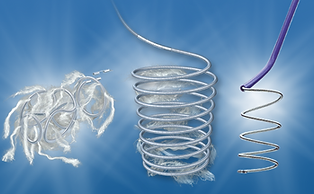What are collaterals?
In cyanotic congenital heart disease, that is, heart defects that cause a mixture of oxygenated and non-oxygenated blood, it is very common to find vessels that have developed to bring more blood to the arteries of the lungs; these vessels are called Multiple AortoPulmonary Collaterals Arteries (MAPCA). Veno-venous collaterals can also be found after palliation surgery for a univentricular heart.
These collaterals can be objectified by ultrasound, cardiac scan, but above all it is necessary to perform a right heart catheterization to identify them and see their path.

Pulmonary atresia with ventricular septal defect is a congenital malformation in which the newborn does not have continuity between the right ventricle and the pulmonary artery. Blood therefore reaches the pulmonary arteries via collaterals from the aorta, the MAPCAs.
Should the MAPCAs be closed?
The condition for occluding a MAPCA is that the flow delivered by the anterograde pathway (from the RV to the PA) is deemed to be sufficient for adequate pulmonary circulation. In this case, MAPCAs may contribute to increased blood flow to the lungs, leading to pulmonary hypertension .
MAPCAs can therefore be closed pre-operatively because they can complicate surgery, or post-operatively if it is considered that closing them beforehand risks increasing oxygen depletion in the blood.
Should veno-venous collaterals be closed?
Veno-venous collaterals develop postoperatively in palliative surgery of a univentricular heart. They are closed when they cause significant clinical desaturation.
How is a MAPCA embolization procedure performed?
The procedure can be performed under local anesthesia, but for children under 14 years of age, deep sedation or general anesthesia is preferred so that they do not move. A puncture is performed in the groin and a catheter is passed along the artery or vein to the branch that we want to block. To embolize the artery, either coils or closure devices will be used.
At the end of the procedure, the groin is compressed for about ten minutes and then a pressure bandage is applied. The child is monitored in the recovery room until he or she is fully conscious and then returned to the parents. Feeding is only allowed two hours after the end of the procedure to avoid the risk of choking. Discharge is usually the next day after an ultrasound scan.
What are the complications of a collateral embolization procedure?
Despite the experience of the operators and the significant technical progress concerning catheters and devices, this is an invasive procedure involving risks:
-
allergic complications most often linked to the use of anesthesia products.
-
Vascular complications at the femoral puncture site: the most common is a hematoma which results in a bluish appearance usually without consequence and disappearing after a few days. Rarely (<1% of cases), a vascular injury may require surgical repair or transfusion. Thrombosis of the artery can also occur.
-
cardiovascular complications during the hospital period : they are very rare (<0.5% of cases) of stroke, hemorrhagic effusion around the heart or displacement of the device, which may require additional intervention, sometimes surgical.
-
Cardiac complications after hospital discharge : Hemoptysis (coughing up blood).
-
complications leading to death : they are very exceptional (<0.1%).
It is important to note that these complications are rare, and the benefits of collateral occlusion usually outweigh the risks.
Aortopulmonary collateral embolization
Vascular embolization
Our location
Make an appointment
LUH Les Ambassadeurs
Appointment
Monday - Friday: 8 a.m. - 3:30 p.m.

Visit us
Insurance
At Jakamy Heart Center, we understand the importance of easy and hassle-free insurance claim processing. Our team is here to help you verify your insurance coverage and answer any questions you may have. Feel free to contact us for personalized assistance.
Our goal is to make your experience as pleasant as possible. We are committed to providing transparent and clear information about the insurance plans we accept. Contact us today to see if your insurance is accepted and to get the care you need.




